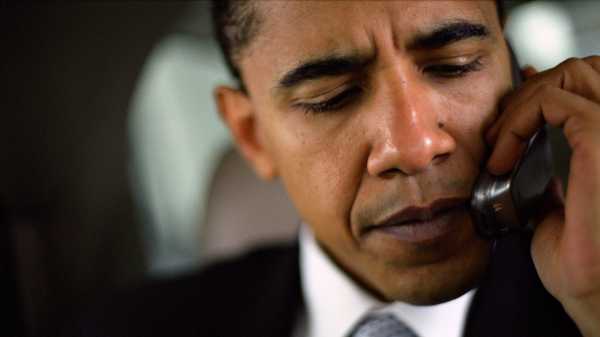
Our memories of the Obama Administration heighten the surreality of the
Trump era: every Trumpian indignity seems to have a counterpoint—an
Obama meme, a Pete
Souza photograph. Last week alone gave us multiple occasions to marvel at the
dissonance: the unveiling at the National Portrait Gallery of the Obamas’ official portraits, by Kehinde
Wiley and Amy
Sherald, reminded us of their thoughtful sophistication. A Valentine’s Day tweet
from Barack to
Michelle evoked their
natural affection and mutual respect. And the Parkland, Florida,
shooting at Marjory Stoneman Douglas High School reminded us of the
empathy that Obama brought to national tragedies.
The new podcast “Making Obama,”
from WBEZ Chicago, hosted by Jenn White and produced by Colin McNulty,
helps the Obama-nostalgic to push past wistfulness and despair by
reacquainting us with who Obama was before he became mythologized—and to
see what lessons we can glean from the making of political leaders. Like
its predecessor, “Making
Oprah,”
which was produced by the same team, “Making Obama” grounds its
subject’s story in Chicago specifics. Though it includes some soaring,
stirring Obama rhetoric—that Grant Park acceptance speech, in 2008
(“Hello, Chicago!”)—it’s
centered on humbler stories. A teaser for future episodes includes a
clip in which someone says, “He said, ‘Yes we can—is that too corny?’ ”
and another of a man saying, “We had a fund-raiser for him, here in this
apartment. And I must say he was terrible.”
The six-episode series traces Obama’s career from his arrival in Chicago
to his keynote speech at the 2004 Democratic National
Convention—at which point,
White told me recently, “the story becomes more familiar to people. Then
he’s this national figure.” It begins in the sanctuary of Lilydale First
Baptist Church, on the South Side of Chicago. White is talking to
Reverend Alvin Love, who has been the pastor there for more than thirty
years, and who tells her of an encounter he had at the church in 1985.
At the time, he had an aging congregation and things in the neighborhood
were tough. “There was a lot of crime,” he says. “People would break in.
We could not keep a P.A. system in this church, and we could not keep
silverware in the kitchen.” One day, two people had come asking him for
money for food, and he gave it to them. “After the second one left—my
office is all windows to the street—I see this skinny guy coming up, and
the first thing came in my head was, No, no. Not another one.” It was
Obama, with slightly worn shoes and rolled-up shirt sleeves, wanting to
introduce himself and talk about the community. This appealed to Love,
but he was less impressed by Obama’s “My mother’s from Kansas and my dad
is from Kenya” routine. “That shtick of his did not resonate with me at
all,” he recalls. “And I didn’t know at the time that that was his
shtick, until I heard it several times after that. As I look back on it,
I think he did it more for his own nerves than he did to disarm people.
He assumed that he was an outsider coming in.”
In Episode 1, we learn about how Obama, twenty-three, idealistic, and a
graduate of Columbia, drove to Chicago to take a job with the Developing
Communities Project, a church-focussed group on the South Side, whose
white leadership wanted to find a black organizer who could foster trust
among people in the neighborhood. The area had been badly hit by the
collapse of the steel industry. A local parishioner recalls that, when
Obama was first introduced to her group, a peer leaned over to her and
said, “They will chew him up and spit him out.” Obama looked young,
naïve. “But he was straightforward,” she continues. “He answered our
questions honestly. Things that he didn’t know, he admitted he didn’t
know. As we talked with him, I think we all realized that this was
someone we could work with and that we could make progress with.”
As Obama worked with the group, he ran into governmental
shortcomings—public-housing agencies saying that the organization
could fund asbestos removal or bathtub repair but not both, for
instance. After much wrangling, and a community meeting that verged on a
riot—we hear some of it, frustration boiling over—the group and the
agencies struck a deal. But in Obama’s three years of community
organizing, the show tells us, it became clear to him that he needed to
enter public life to effect more significant change. Episode 2,
“Politics Ain’t Beanbag,” explores Chicago’s famously sharp-elbowed
political scene and the roles that Mayor Harold Washington, the Chicago
machine, and the legacy of Mayor Richard Daley played in Obama’s
political development. His experiences during that time both educated
him and served his political narrative—of idealism mixed with
pragmatism—in the years to come.
The sound of “Making Obama” is spare, un-grand. Sometimes we hear a
jittery snare drum and a kick drum; there’s a sense of immediacy, of
being close to the action. White’s narration is layered with interviews,
snippets of Obama’s audiobook—I’m not sure I’ve heard audiobook samples
in a podcast before—and relevant clips of everything from Martin Luther
King, Jr., to scene-setting eighties radio, like “Careless Whisper.”
Eventually, we hear the man himself. “Gotta make time for the home-town
public-radio station,” he tells White, and we’re reacquainted with his
self-aware folksy benevolence.
In six episodes, “Making Obama” can’t go too deep on any of the stories
we hear, but it gives us an oral-history overview that feels useful in
our chaotic political era. The details of Obama’s journey to leadership
begin to form a blueprint for future action. Obama’s meteoric rise may
seem inevitable in hindsight, but it wasn’t. “The fact that he is not a
native Chicagoan, the fact that he had an unusual name and didn’t have
the same kind of history with the city as many of the established
politicians here, the fact that he would be able to build this political
career that eventually sent him to the White House, is very unlikely
when you look at how Chicago politics works,” White said. “You don’t
know where leadership is going to emerge from.”
Hewing too closely to our expectations limits our ability to recognize
potential leaders—and we need to keep our eyes peeled. “What’s been a
really interesting reminder to me in working on the podcast, is that
when I think about Chicago or Detroit, where I’m from, is that there are
so many twentysomethings there who are doing the same kind of work that
he did,” White told me. “Who are in their neighborhoods, who are in
their cities, working to make things better at a grassroots level.” May
they rise up and help us out.
Sourse: newyorker.com






